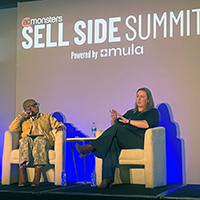The Second Generation of Twitter
Twitter has been busy lately — the company recently announced some changed rules for developers and acquired TweetDeck. Now there are two big rumors swirling around the site: one involves the possible acquisition of AdGrok and another involves the potential launch of a photo-sharing platform. The former would reflect a realization that Twitter’s business model wasn’t going to get the company very much money; the latter would spell the end of a love affair with developers. (The Next Web)
Should You Buy PPC Ads for Your Brand Keywords?
If you rank organically for your brand terms, why would you pay for ads on them? While this line of thinking initially makes sense, a few minutes spent delving into the subject shows that you should still buy brand keywords no matter how strong your organic positions are. Among the points made to support this statement are: ads and organic positions have a symbiotic relationship, combining ads and organic positions boosts trust and your competition will advertise on your brand. (BlueGlass)
Free Competitive Research on Domains
Researching a competitive domain has many benefits. You can find high-traffic keywords, profitable keywords and low-hanging keyword fruit, among other helpful things. Evaluating a domain from a competitive research point of view is made easier with free tools like SEMRush, Compete and Alexa. Here’s a walkthrough for these and other free tools for conducing research on domains. (SEO Book.com)
Delegating Your SEO Tasks
It’s incredibly difficult to be an expert in SEO, link building, copywriting, analytics, PPC, social media, conversion analysis and coding all at the same time. For those superhumans who can do this all, while blogging, reporting, reading, etc., kudos. For the rest of us, delegation is in order. Here’s a look at the four main reasons why people don’t delegate, and how to overcome them. (E-Marketing Performance)
The Search Metrics to Show Your Boss
Convincing bosses that SEO is important is a difficult task for many. "Sometimes we search marketers don’t think about the business, instead trying to explain how search works or why it is important. You might find more success if you focus on the numbers that will make the boss sit up and take notice." Start with return on investment, online conversions and site traffic. (Search Engine Guide)
3 Key Metrics for Measuring Social Media Success
There’s a big need for “simple, standardized measurement techniques that clearly show whether social campaigns are working to deliver real brand impact and actual sales.” While this is a complex issue to tackle, there are three simple metrics to start with: total online community size (sCRM), monthly referred social traffic to site (sTraffic) and social monthly impressions (sMI). (Search Engine Watch)
How Mobile Searchers Are Changing Keyword Research
Too many SEOs are under the impression that desktop and mobile SEO are the same. Mobile searchers behave quite differently than the typical desktop searcher, and this fact could be affecting bottom lines. For one thing, mobile searchers have the ability to search without keywords (e.g., via Google Goggles), which means keyword research and optimization for logo queries is important. Another key thing to keep in mind is how context can change the meaning of mobile queries. (Search Engine Land)
Actionable Link-Building Strategies
Here are some actionable link-building techniques you can use right away. Two of them involve Screaming Frog, which is some pretty nifty software for link building that can be used to get a hook in your outreach and snipe competitors’ links. You can also revamp old content and data that received links, and start doing weekly roundups of industry news. (SEOmoz)
Is Google Wallet Important?
Here’s an overview of what Google Wallet is and what need is sets out to fill. While Google is right in thinking that replacing credit cards with smartphones is a great idea, “matters of implementation are likely to interfere.” (Monday Note)
SEO Tricks to Watch for
While “black hat SEO” is certainly bad, bad operates have been over-hyped. The main problem, according to one chief marketing officer, isn’t so much black hat techniques as useless techniques. “The bad news is that old tricks – keyword stuffing, link-swapping, writing junky articles – and unethical tricks are increasingly blending.” SEO professionals should watch for link farming and link swapping, stuffing and spamming, and getting oversold. (The Globe and Mail)
Google Correlate for Researching Keyword Popularity and Trends
Google has added yet another nifty tool to its stable: Google Correlate. This new tool enables you to correlate search trends with any data you want to toss into the mix. “With Google Correlate, you can upload data charted over either time or space and Google will look for matching patterns in search volumes. If you don’t have data of your own to upload, you can simply specify search terms, and Google will calculate the trending pattern and show matching patterns.” (Search Engine Land)
Using Google Keyword Status Data
When you encounter those keywords that have very low to no impression volume in a paid-search campaign, it’s important to understand whether this is an indication of a fixable problem or if the keyword just has plain old paltry search volume. Google offers a few pieces of information to help make this distinction. Here’s what to check for and some tactics to use for some fix-ups. (RKGBlog)
4 Facebook Marketing Tactics You Might Not Know About
Test the extent of your knowledge of Facebook marketing by reading about these four lesser-known tactics: 1) Facebook Insights for your website, 2) Facebook comments, 3) local business listings and 4) Facepile. (SEOmoz)
Internet Ad Revenues: $7.3 Billion in Q1 2011
According to the Interactive Advertising Bureau (IAB), Internet advertising revenues in the U.S. hit $7.3 billion in the first quarter of 2011, a 23 percent increase from the same quarter last year. This also marked the highest first-quarter revenue figure ever. (IAB.net)
Google Offers and Google Wallet Make Their Official Debuts
Google Offers and Google Wallet were officially introduced to the world Thursday. Google Offers is another daily-deals service, but it’s tie-in with Google Wallet is what sets it apart from Groupon and LivingSocial. “Among other things, Google Wallet will be able to store your credit card information (Google’s launch partners include MasterCard and Citi) as well as loyalty rewards, purchase points, and any saved-up Google Offers that might apply. Then, users who have Near Field Communications (NFC) enabled Android phones will be able to simply whip out their devices when shopping and tap them on electronic payment processors in order to get deals and pay for their goods.” This might be nifty and all, but this kind of seems like a solution to a problem that doesn’t actually exist, according to one writer. Don’t expect an overnight transition to Google Wallet anytime soon. (Ars Technica, paidContent)
Search Engines: Affiliates and Publishers
Google is monetizing the hell out of the data it has its paws on. With Google Advisor, the search engine has at least six ways to monetize the consumer financial product market alone. This isn’t even to mention books, travel, mobile/local and the dirty markets it’s dipped its toes into. Google, along with the other major search engines, are also monetizing organic search results and pushing results below the fold. "As search engines take big slices out of their search ecosystems, the gap between winners & losers will only grow." (SEO Book.com)
Online Video Ads Achieve Higher Viewer Attention and Recall Than TV Ads
According to a study from YuMe, a video advertising technology company, and the IPG Media Lab, the "attention of TV viewers drops off three times faster from content to ad; online video content captures 8.5 percent more attention than TV content; and online video ads have 18+ percent more fully attentive viewers than TV ads." The study also found that online video ads have 20 percent more attentive advertising impressions. (YuMe.com)
Facebook Still Struggles With Trust Issues
Netpop’s "Trust is Social Currency" report found that 80 percent of social-site users are uncertain or uneasy about the social sites they use. "This is particularly true of Facebook: 85 percent of Facebook users are either uncertain or explicitly concerned." Page administrators have their work cut out for them when it comes to getting personal data from their fans and engaging with them. (AllFacebook)
Starting an SEO Blog
If you want to leverage your SEO knowledge into a blog, there a number of things to consider. How do you straddle the fence between being found and being relevant? Peruse through the major SEO blog out there and you’ll notice they all have something in common: content generation. "More than anything, consist quality is the killer secret. None of the top SEO blogs became huge overnight, but they gradually worked their way into peoples’ RSS streams with quality content and great promotion on a consistent basis. Nine women can’t make a baby in a month." (Search Engine Journal)
How to Create an Email Marketing Calendar
An email marketing calendar is your ticket to keeping you and your team organized. It can cover emails, blogs and social media interactions, among other things. Get a game plan — schedule content marketing pieces with any kind of calendar software. Also, look at some data and plan around the holidays. (MailerMailer Blog)



